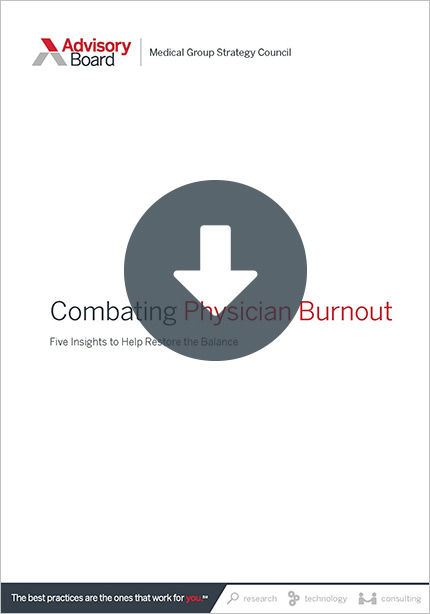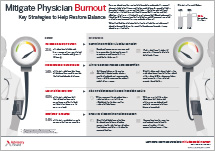Auto logout in seconds.
Continue LogoutMore than 40% of physicians are burned-out—but some specialties are suffering more than others, according to Medscape's 2018 National Physicians Burnout & Depression Report.
Solving burnout is just the start—here are 11 more things C-suite leaders need to know for 2018
For the report, Medscape surveyed more than 15,000 physicians from 29 different specialties, asking about a number of topics, including burnout, depression, and happiness at work.
Burnout and depression among physicians
Forty-two percent of all physicians surveyed reported feeling burned out, with more women reporting burnout than men (48% and 38%, respectively). According to the survey, the rate of burnout climbed "dramatically by age," ranging from 35% of doctors ages 28-34 to 50% of those ages 45 to 54, with physicians ages 55 to 69 in the middle at 41%.
Burnout rates varied by specialty, with the most burned out physicians including:
- Critical care specialists (48%);
- Neurologists (48%);
- Family medicine specialists (47%);
- OB/GYNs (46%); and
- Internal medicine specialists (46%).
In comparison, the specialists reporting the lowest rates of burnout included:
- Plastic surgeons (23%);
- Dermatologists (32%);
- Pathologists (32%);
- Ophthalmologists (33%); and
- Orthopedists (34%).
As for the contributors to burnout, 56% of physicians said they have too many bureaucratic tasks, such as charting and paperwork, while 39% said spending too many hours at work. When asked what could help curb their rates of burnout, 35% of respondents said higher compensation would help and 31% said they would like a more manageable work schedule.
In regards to coping with burnout, 50% of physicians said they turn to exercise, while 46% said they talk to their family/friends. About a third said they eat junk food to cope, while about a fifth said they drink alcohol.
How doctors believe depression affects their work
The survey also questioned respondents about feelings of depression, with 14% of respondents saying they were both burned out and depressed. Among respondents overall, 15% said they experienced some measure of depression, with 12% saying they were colloquially depressed ("feeling down") and 3% saying they were clinically depressed. Among those who reported being depressed, the biggest contributor to their depression was their job, followed by finances.
When asked if their depression affected their interactions with patients, 40% of physicians who reported experiencing depression said it did not, while around a third said they were less engaging, less friendly, and more exasperated because of the condition. According to the survey, 14% of physicians who said they were depressed said they have made errors they would not otherwise have made—and 5% said they have made errors that could harm patients.
Similarly, 42% of physicians who said they were depressed reported being less engaged with or less able to actively listen to their staff and peers because of their depression, with the same number reporting feeling more easily exasperated.
Upcoming Webconference
Learn the main drivers of physician burnout—and help your organization combat itHappiness at work
Medscape also asked physicians if they were "extremely happy" at work. The specialists most likely to report that they are were:
- Ophthalmologists (37%);
- Orthopedists (35%);
- Plastic surgeons (35%);
- Pathologists (34%);
- Dermatologists (33%);
- Psychiatrists (33%); and
- Gastroenterologists (33%).
Similarly, the specialists least likely to report that they were "extremely happy" at work were:
- Cardiologists (21%);
- Internal medicine specialists (21%);
- Critical care specialists (22%);
- Family medicine specialists (22%);
- Diabetes & endocrinology specialists (23%); and
- Infectious diseases specialists (23%) (Peckham, Medscape, 1/17; Ault, Medscape, 1/17).
Mitigate physician burnout with these 4 key strategies
Physician burnout links to a 16% decrease in patient satisfaction, an 11% increase in reported medical errors, increased turnover, and early retirement. Act now to prevent further damage to your business, physicians, and patients.
Don't miss out on the latest Advisory Board insights
Create your free account to access 1 resource, including the latest research and webinars.
Want access without creating an account?
You have 1 free members-only resource remaining this month.
1 free members-only resources remaining
1 free members-only resources remaining
You've reached your limit of free insights
Become a member to access all of Advisory Board's resources, events, and experts
Never miss out on the latest innovative health care content tailored to you.
Benefits include:
You've reached your limit of free insights
Become a member to access all of Advisory Board's resources, events, and experts
Never miss out on the latest innovative health care content tailored to you.
Benefits include:
This content is available through your Curated Research partnership with Advisory Board. Click on ‘view this resource’ to read the full piece
Email ask@advisory.com to learn more
Click on ‘Become a Member’ to learn about the benefits of a Full-Access partnership with Advisory Board
Never miss out on the latest innovative health care content tailored to you.
Benefits Include:
This is for members only. Learn more.
Click on ‘Become a Member’ to learn about the benefits of a Full-Access partnership with Advisory Board
Never miss out on the latest innovative health care content tailored to you.


